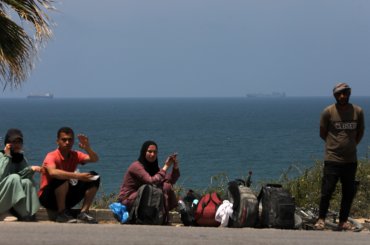Update: Palestinian journalist Muhammed Al-Qeeq is in detention in an Israeli hospital approaching his 50th day on hunger strike. Several sources have reported that he is nearing death. Our original post reported that he had gone into a coma. We have since been told by the Palestine Solidarity Committee that this is not the case, though Al-Qeeq’s condition is urgent. What follows is the report from Amnesty International and our original report.
Amnesty International:
Palestinian journalist Muhammed al-Qiq, held without charge or trial by Israel for nearly three months and on hunger strike since 25 November, is at imminent risk of death. Despite the Israeli High Court of Justice reviewing his case, he remains effectively detained with no charge or trial.
An independent doctor visited al-Qiq at HaEmek hospital in Afula, Israel, on Thursday 4 February, and said that he appears to be close to death, according to Physicians for Human Rights – Israel (PHR-Israel), who organized the visit. Although al-Qiq refused to be examined, visible signs point to severe ill-health. PHR-Israel said that their doctor and the hospital’s medical staff agreed that it was highly unusual for a hunger-striker to still be conscious and alive at this point of a hunger strike, and that even if he were treated, it may not save his life. Al-Qiq has refused treatment up until this point, and has told PHR-Israel that he does not wish to be treated while he is conscious. His medical team at HaEmek hospital, who decided to respect his wish not to be treated after earlier forcibly treating him, has disregarded two recommendations from the hospital’s ethics committee recommending he be forcibly treated again.
Al-Qiq initially launched his hunger strike to protest the torture or other ill-treatment to which he says he was subjected in Israeli custody, and to demand his release from detention he believes is motivated by his work as a journalist. Israel has held him without charge or trial in a practice known as administrative detention. On Thursday 4 February Israel’s High Court of Justice decided to “suspend” his detention order given his precarious and deteriorating health. They did not, however, rule on the validity of holding al-Qiq without charge or trial. To Amnesty International’s knowledge, the High Court has only ever annulled an administrative detention order in one case (in 1990), despite the fact that the practice violates the detainee’s right to a fair trial and can constitute arbitrary detention. Amnesty International also considers that Israel’s use of administrative detention itself may amount to cruel, inhuman and degrading treatment, given the detainee’s inability to know why they are being detained or when they will be released. Amnesty International, Starved of justice: Palestinians detained without trial by Israel (Index: MDE 15/026/2012), June 2012,
It is unclear whether the High Court’s “suspension” of al-Qiq’s detention order will have any actual effect. The newspaper Haaretz reported that its conditions stipulate that al-Qiq must remain in hospital, and must seek permission from the Israeli authorities should he wish to receive treatment at another hospital. Jack Khoury, “High Court Suspends Detention of Hunger-striking Palestinian Journalist”, Haaretz, 4 February 2016.
According to al-Qiq’s lawyer, the High Court said that the authorities would re-arrest al-Qiq should his health improve, and resume the detention order against him. The “suspension” therefore appears to be a mere gesture, designed to offer the illusion of freedom to prompt al-Qiq to end his hunger strike. Al-Qiq has stated that he will continue his hunger strike until he is fully free or he dies.
According to al-Qiq’s lawyer, the Israeli authorities offered al-Qiq their assurances that he would be released on 1 May if he ended his hunger strike, an offer that al-Qiq again rejected. This offer raises troubling questions about the basis for al-Qiq’s detention. If he was detained for real and imperative reasons of security, how can the authorities know he will no longer pose a threat as of 1 May?
Amnesty International has concerns that the Israeli authorities are using administrative detention as a method of punishing Muhammed al-Qiq without prosecuting him, which would amount to arbitrary detention. They should drop the detention order against him and release him unless he is to be charged with an internationally recognizable criminal offence and tried in accordance with international fair standards. Amnesty International reiterates its call on Israel to end the practice of administrative detention.
For background on Muhammed al-Qiq’s case, please see Amnesty International, “Israel must end ill-treatment of hunger-striking Palestinian detainee” (Index: MDE 15/3299/2016), 22 January 2016.
Original:
From IMEMC:
The Palestinian journalist Muhammad Al-Qeeq has fallen into a coma, after entering his 48th day of hunger strike, family sources revealed.
According to the Palestinian News Center (PIC), Al-Qeeq’s wife said that her husband had entered a very critical stage of his hunger strike that was started on Nov. 24, 2015.
Emek Medical Center, the hospital in Afula where he is hospitalized, has begun taking forced blood samples from his body as a prelude to force feed him, the wife quoted his lawyer as saying.
On the forty-sixth day after he began his hunger strike, Al-Qeeq lost the ability to speak or walk, and began to vomit and urinate blood.
According to his lawyer, Ashraf Abu Snena, Al-Qeeq can barely communicate using signals.
Both his legs and one of his arms are handcuffed to his bed at all times, and he already lost 22 kilos, according to the PNN.
He is from the village of Dura, near Hebron, and used to work as a reporter for the Saudi news channel “Almajd.”
Al-Qeeq was arrested on November 21, 2015 when Israeli soldiers blew up the front door of his house and took him in for interrogation at Israel’s Kishon (Jalame) detention center.
He went on hunger strike in protest against being held under administrative detention without charge or trial.
According to PIC, over the past week, Al-Qeeq has refused an Israeli offer for his release after extending his administrative detention for one last time. He declared his insistence on maintaining his hunger strike until his unconditional release.



What strength to refuse so long! Summud!
Put copies of this article in the Hollywood Oscars’ swag bags.
I say, live another day to continue the fight!
Killing yourself will not impress any of your oppressors and a few weeks after your death nobody will remember you anymore. You should destroy your enemies, not yourself.
So stop this nonsense and if it is not too late, come back to fight another battle.
I believe he’s on his 80th day today (Feb. 16, 2016).